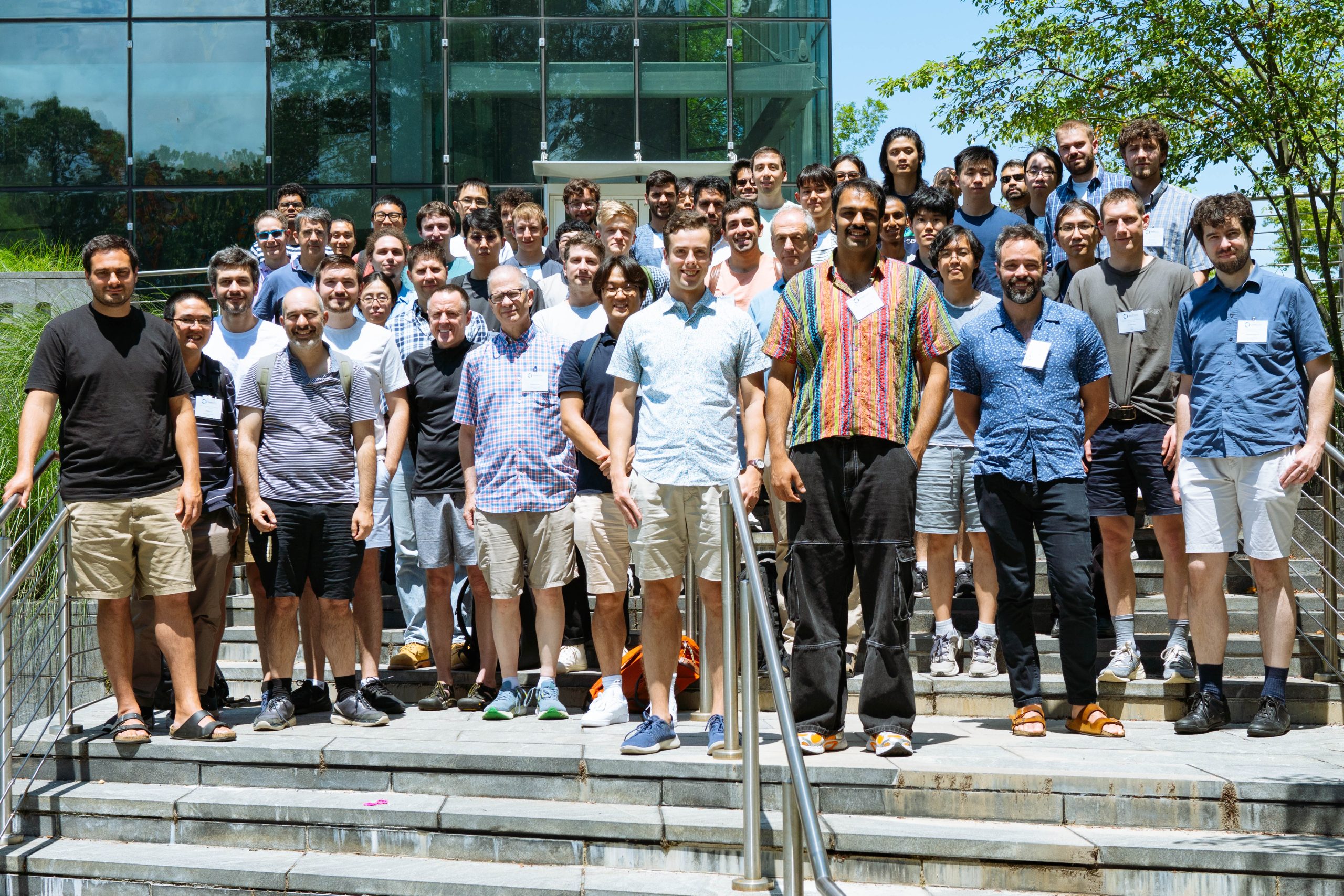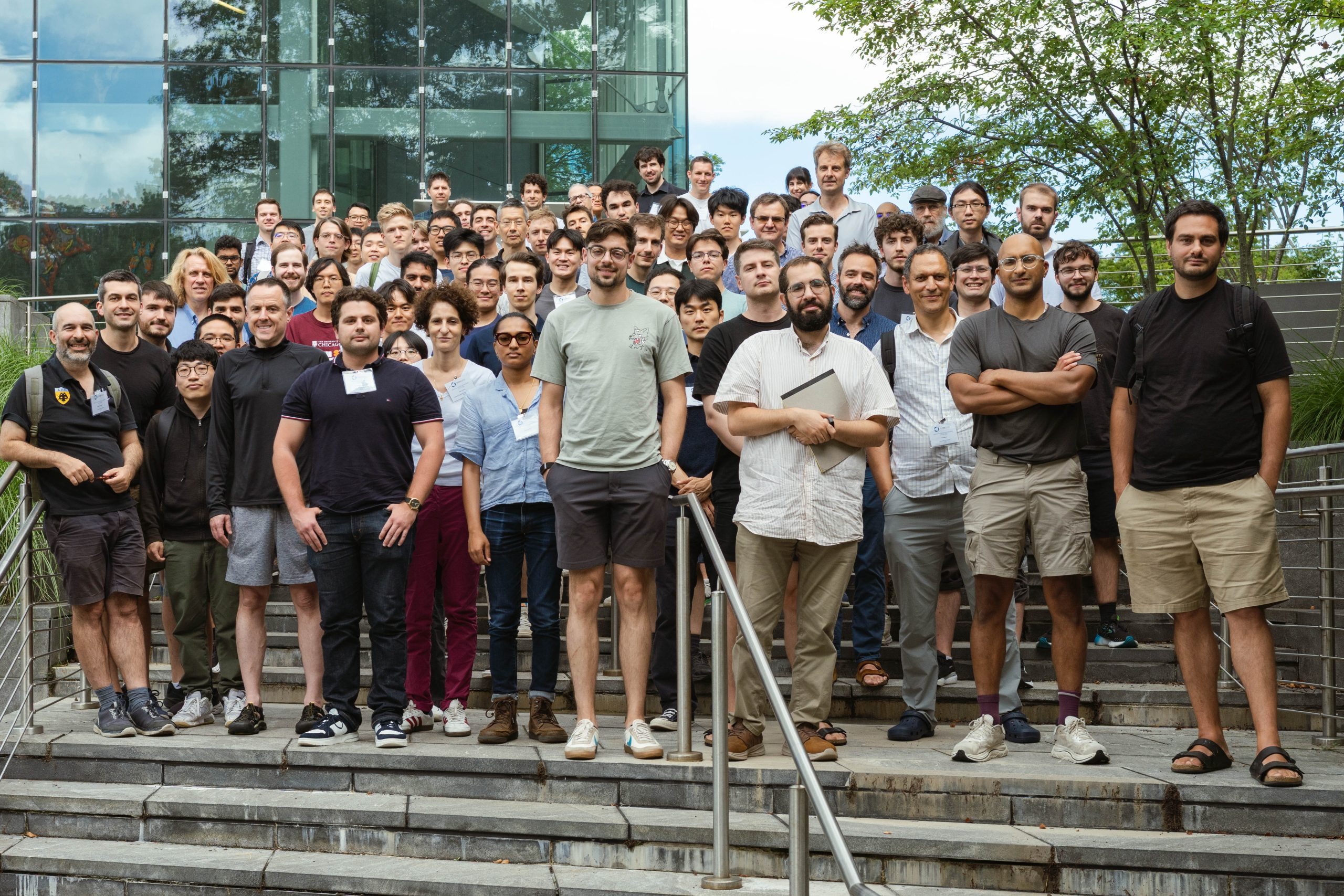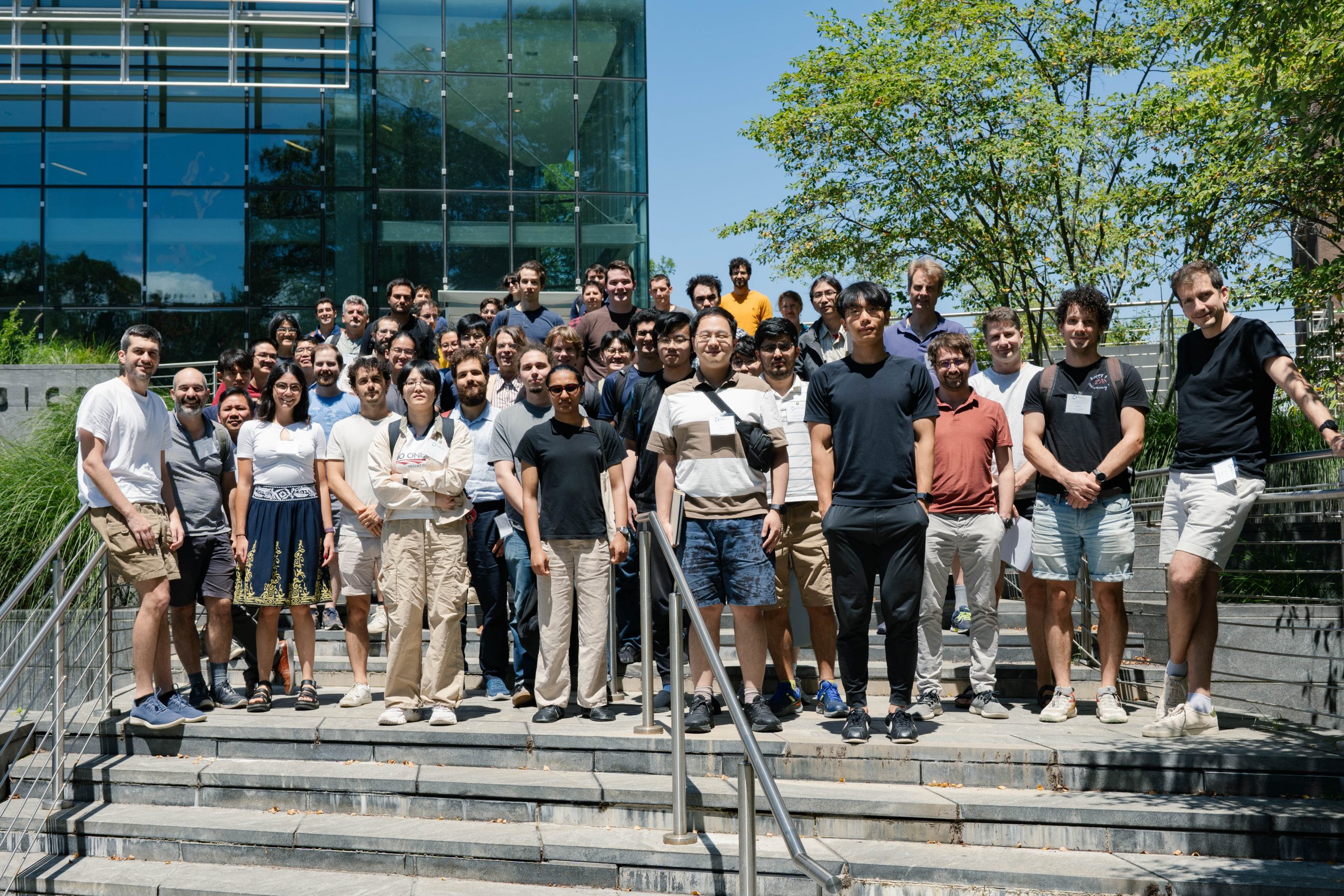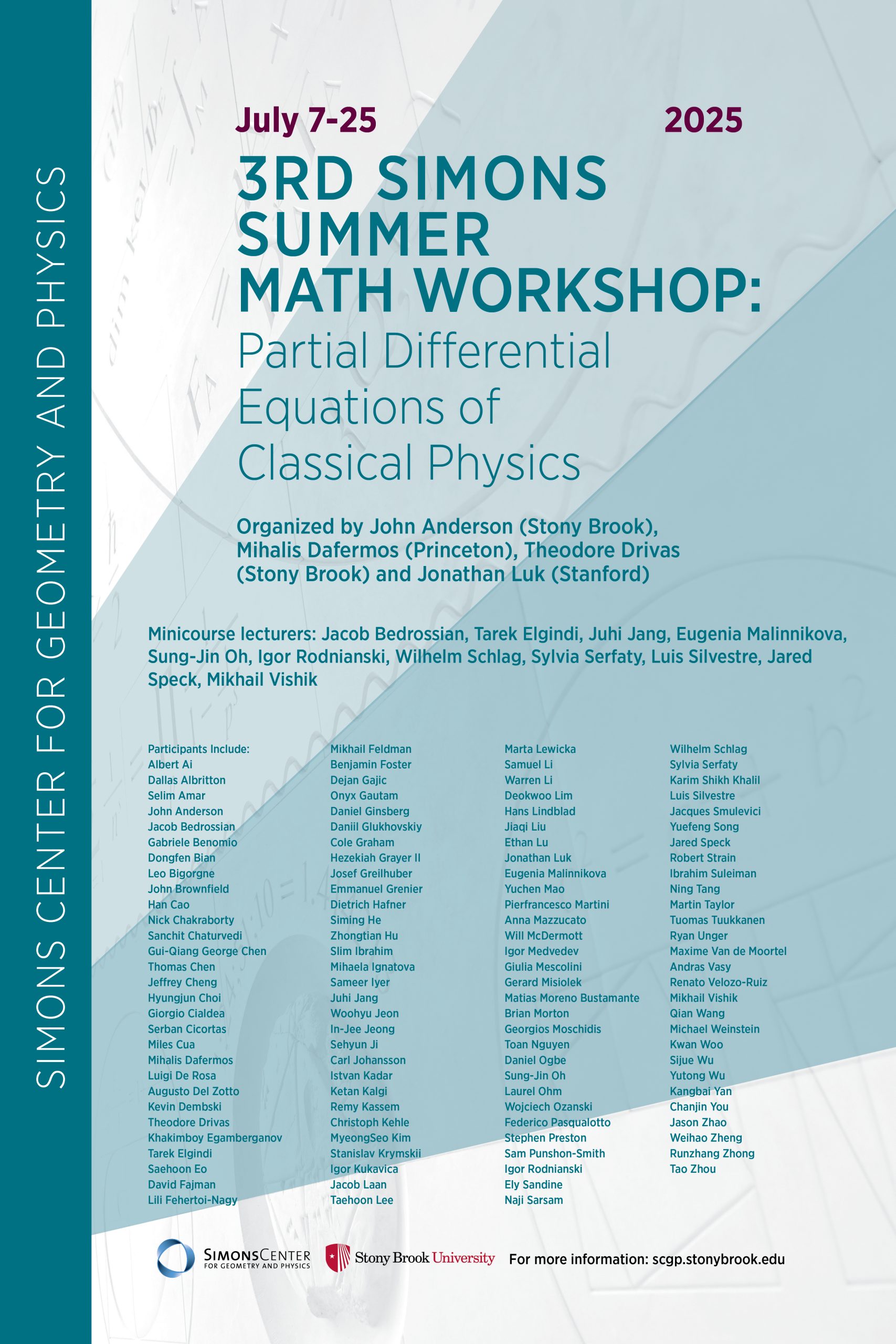Participant ListWeek 1 ScheduleWeek 2 ScheduleWeek 3 Schedule View Videos Special EventsSummer Concert SeriesDanfords Shuttle Schedule
Organized by:
- John Anderson (Stony Brook)
- Mihalis Dafermos (Princeton)
- Theodore Drivas (Stony Brook)
- Jonathan Luk (Stanford)
Recent years have seen many exciting advances in the study of PDEs. Experience has shown that ideas developed in the context of certain PDEs can often be adapted to say something interesting about other equations as well. Even when this is not the case, probing the adaptability of techniques to different equations can help find new techniques, or at the least find interesting new directions for study. The size and specialization of the community studying PDEs means that there are limited opportunities for different groups to have substantial interactions, despite the clear benefits.
This workshop aims to provide an opportunity for such in depth interactions among mathematicians interested in fundamental questions about PDEs in classical physics. It will feature minicourses by experts which provide answers to such questions, and which provide an introduction to the powerful techniques involved. These minicourses will be geared towards advanced graduate students as well as other established researchers who may specialize in different areas. Each week will feature about three such minicourses.
One of the main goals of the workshop is to encourage discussions outside of the minicourses among the many participants. For this reason, afternoons will often be free to help facilitate such interactions, and participants are encouraged to stay for multiple weeks of the three week program. The program will also feature sessions run by special lecturers with the sole aim of finding interesting directions for further study. Various social activities will also be organized to further facilitate interactions among the participants.
Minicourse lecturers: Jacob Bedrossian, Tarek Elgindi, Juhi Jang, Eugenia Malinnikova, Sung-Jin Oh, Igor Rodnianski, Wilhelm Schlag, Sylvia Serfaty, Luis Silvestre, Jared Speck, Mikhail Vishik.
| Time |
Title |
Speaker |
Location |
| 8:30am |
Breakfast |
N/A |
SCGP Cafe |
| 9:15am |
Analysis of some kinetic equations (Part 1) |
Luis Silvestre |
SCGP 102 |
| 10:45am |
Coffee Break |
N/A |
SCGP Cafe |
| 11:15am |
Shocks in multi-dimensional compressible fluids(Part 1) |
Jared Speck |
SCGP 102 |
| 12:45pm |
Lunch |
N/A |
SCGP Cafe |
| 2:00pm |
Long-term behavior of linear and nonlinear waves (Part 1) |
Sung-Jin Oh |
SCGP 102 |
| 3:30pm |
Tea Break |
N/A |
SCGP Cafe |
| Time |
Title |
Speaker |
Location |
| 8:30am |
Breakfast |
N/A |
SCGP Cafe |
| 9:15am |
Long-term behavior of linear and nonlinear waves (Part 2) |
Sung-Jin Oh |
SCGP 102 |
| 10:45am |
Coffee Break |
N/A |
SCGP Cafe |
| 11:15am |
Shocks in multi-dimensional compressible fluids (Part 2) |
Jared Speck |
SCGP 102 |
| 12:45pm |
Group Photo |
N/A |
SCGP Lobby |
| 1:00pm |
Lunch |
N/A |
SCGP Cafe |
| 2:00pm |
Analysis of some kinetic equations (Part 2) |
Luis Silvestre |
SCGP 102 |
| 3:30pm |
Tea Break |
N/A |
SCGP Cafe |
| Time |
Title |
Speaker |
Location |
| 8:30am |
Breakfast |
N/A |
SCGP Cafe |
| 9:15am |
Analysis of some kinetic equations (Part 3) |
Luis Silvestre |
SCGP 102 |
| 10:45am |
Coffee Break |
N/A |
SCGP Cafe |
| 11:15am |
Long-term dynamics of Hamiltonian PDEs, scattering and asymptotic completeness (Part 1) |
Wilhelm Schlag |
SCGP 102 |
| 12:45pm |
Lunch |
N/A |
SCGP Cafe |
| 3:00pm |
Special Event: West Meadow Beach |
N/A |
Trustees Rd, Stony Brook |
| Time |
Title |
Speaker |
Location |
| 8:30am |
Breakfast |
N/A |
SCGP Cafe |
| 9:15am |
Shocks in multi-dimensional compressible fluids (Part 3) |
Jared Speck |
SCGP 102 |
| 10:45am |
Coffee Break |
N/A |
SCGP Cafe |
| 11:15am |
Long-term dynamics of Hamiltonian PDEs, scattering and asymptotic completeness (Part 2) |
Wilhelm Schlag |
SCGP 102 |
| 12:45pm |
Lunch |
N/A |
SCGP Cafe |
| 3:30pm |
Tea Break |
N/A |
SCGP Cafe |
| 4:00pm |
Summer Concert Series |
Piano Performance by Liya Nigmati |
SCGP 103 |
| 5:15pm |
Transportation to Stony Brook Village |
N/A |
SCGP Parking lot |
| 7:00pm |
Summer Workshop Banquet |
N/A |
Three Village Inn |
| Time |
Title |
Speaker |
Location |
| 8:30am |
Breakfast |
N/A |
SCGP Cafe |
| 9:15am |
Long-term behavior of linear and nonlinear waves(Part 3) |
Sung-Jin Oh |
SCGP 102 |
| 10:45am |
Coffee Break |
N/A |
SCGP Cafe |
| 11:15am |
Long-term dynamics of Hamiltonian PDEs, scattering and asymptotic completeness (Part 3) |
Wilhelm Schlag |
SCGP 102 |
| 12:45pm |
Lunch |
N/A |
SCGP Cafe |
| 3:30pm |
Tea Break |
N/A |
SCGP Cafe |

| Time |
Title |
Speaker |
Location |
| 8:30am |
Breakfast |
N/A |
SCGP Cafe |
| 9:15am |
Mean-field limits by the modulated energy method |
Sylvia Serfaty |
SCGP 102 |
| 10:45am |
Coffee Break |
N/A |
SCGP Cafe |
| 11:15am |
Instability and non-uniqueness for the Euler equations of an ideal incompressible fluid (Part 1) |
Mikhail Vishik |
SCGP 102 |
| 12:45pm |
Lunch |
N/A |
SCGP Cafe |
| 3:30pm |
Tea Break |
N/A |
SCGP Cafe |
| Time |
Title |
Speaker |
Location |
| 8:30am |
Breakfast |
N/A |
SCGP Cafe |
| 9:15am |
Mean-field limits by the modulated energy method (Part 1) |
Sylvia Serfaty |
SCGP 102 |
| 10:45am |
Coffee Break |
N/A |
SCGP Cafe |
| 11:15am |
Instability and non-uniqueness for the Euler equations of an ideal incompressible fluid (Part 2) |
Mikhail Vishik |
SCGP 102 |
| 12:45pm |
Group Photo |
N/A |
SCGP Lobby |
| 1:00pm |
Lunch |
N/A |
SCGP Cafe |
| 4:30pm |
Tea Break |
N/A |
SCGP Cafe |
| 4:00pm |
Summer Concert Series |
Performance by the Jazz Loft |
SCGP 103 |
| Time |
Title |
Speaker |
Location |
| 8:30am |
Breakfast |
N/A |
SCGP Cafe |
| 9:15am |
Mean-field limits by the modulated energy method (Part 2) |
Sylvia Serfaty |
SCGP 102 |
| 10:45am |
Coffee Break |
N/A |
SCGP Cafe |
| 11:15am |
Regularity theory for quasilinear hyperbolic equations (Part 1) |
Igor Rodnianski |
SCGP 102 |
| 12:45pm |
Lunch |
N/A |
SCGP Cafe |
| 3:00pm |
Special Event: West Meadow Beach |
N/A |
Trustees Rd, Stony Brook |
| Time |
Title |
Speaker |
Location |
| 8:30am |
Breakfast |
N/A |
SCGP Cafe |
| 9:15am |
Instability and non-uniqueness for the Euler equations of an ideal incompressible fluid (Part 3) |
Mikhail Vishik |
SCGP 102 |
| 10:45am |
Coffee Break |
N/A |
SCGP Cafe |
| 11:15am |
Regularity theory for quasilinear hyperbolic equations (Part 2) |
Igor Rodnianski |
SCGP 102 |
| 12:45pm |
Lunch |
N/A |
SCGP Cafe |
| 2:00pm |
What would be a mathematical theory of turbulence? (Part 1) |
Jacob Bedrossian |
SCGP 102 |
| 3:30pm |
Tea Break |
N/A |
SCGP Cafe |
| 6:00pm |
Summer Workshop Banquet |
N/A |
SCGP Cafe |
| Time |
Title |
Speaker |
Location |
| 8:30am |
Breakfast |
N/A |
SCGP Cafe |
| 9:15am |
What would be a mathematical theory of turbulence? (Part 2) |
Jacob Bedrossian |
SCGP 102 |
| 10:45am |
Coffee Break |
N/A |
SCGP Cafe |
| 11:15am |
Regularity theory for quasilinear hyperbolic equations (Part 3) |
Igor Rodnianski |
SCGP 102 |
| 12:45pm |
Lunch |
N/A |
SCGP Cafe |
| 3:30pm |
Tea Break |
N/A |
SCGP Cafe |

| Time |
Title |
Speaker |
Location |
| 8:30am |
Breakfast |
N/A |
SCGP Cafe |
| 9:15am |
Introduction to the study of the Euler equation (Part 1) |
Tarek Elgindi |
SCGP 102 |
| 10:45am |
Coffee Break |
N/A |
SCGP Cafe |
| 11:15am |
Singularities and stability in self-gravitating fluids (Part 1) |
Juhi Jang |
SCGP 102 |
| 12:45pm |
Lunch |
N/A |
SCGP Cafe |
| 3:30pm |
Tea Break |
N/A |
SCGP Cafe |
| Time |
Title |
Speaker |
Location |
| 8:30am |
Breakfast |
N/A |
SCGP Cafe |
| 9:15am |
Singularities and stability in self-gravitating fluids (Part 2) |
Juhi Jang |
SCGP 102 |
| 10:45am |
Coffee Break |
N/A |
SCGP Cafe |
| 11:15am |
Introduction to the study of the Euler equation (Part 2) |
Tarek Elgindi |
SCGP 102 |
| 12:45pm |
Group Photo |
N/A |
SCGP Lobby |
| 1:00pm |
Lunch |
N/A |
SCGP Cafe |
| 4:30pm |
Tea Break |
N/A |
SCGP Cafe |
| 4:00pm |
Summer Concert Series |
Performance by the Highline Quartet |
SCGP 103 |
| Time |
Title |
Speaker |
Location |
| 8:30am |
Breakfast |
N/A |
SCGP Cafe |
| 9:15am |
Carleman inequalities and quantitative unique continuation for second order elliptic PDE (Part 1) |
Eugenia Malinnikova |
SCGP 102 |
| 10:45am |
Coffee Break |
N/A |
SCGP Cafe |
| 12:45pm |
Lunch |
N/A |
SCGP Cafe |
| 3:00pm |
Special Event: West Meadow Beach |
N/A |
Trustees Rd, Stony Brook |
| Time |
Title |
Speaker |
Location |
| 8:30am |
Breakfast |
N/A |
SCGP Cafe |
| 9:15am |
Introduction to the study of the Euler equation (Part 3) |
Tarek Elgindi |
SCGP 102 |
| 10:45am |
Coffee Break |
N/A |
SCGP Cafe |
| 11:15am |
Carleman inequalities and quantitative unique continuation for second order elliptic PDE (Part 2) |
Eugenia Malinnikova |
SCGP 102 |
| 12:45pm |
Lunch |
N/A |
SCGP Cafe |
| 3:30pm |
Tea Break |
N/A |
SCGP Cafe |
| 5:00pm |
Transportation to Stony Brook Village |
N/A |
SCGP Parking lot |
| 7:00pm |
Summer Workshop Banquet |
N/A |
Three Village Inn |
| Time |
Title |
Speaker |
Location |
| 8:30am |
Breakfast |
N/A |
SCGP Cafe |
| 9:15am |
Singularities and stability in self-gravitating fluids (Part 3) |
Juhi Jang |
SCGP 102 |
| 10:45am |
Coffee Break |
N/A |
SCGP Cafe |
| 11:15am |
Carleman inequalities and quantitative unique continuation for second order elliptic PDE (Part 3) |
Eugenia Malinnikova |
SCGP 102 |
| 12:45pm |
Lunch |
N/A |
SCGP Cafe |
| 3:30pm |
Tea Break |
N/A |
SCGP Cafe |







